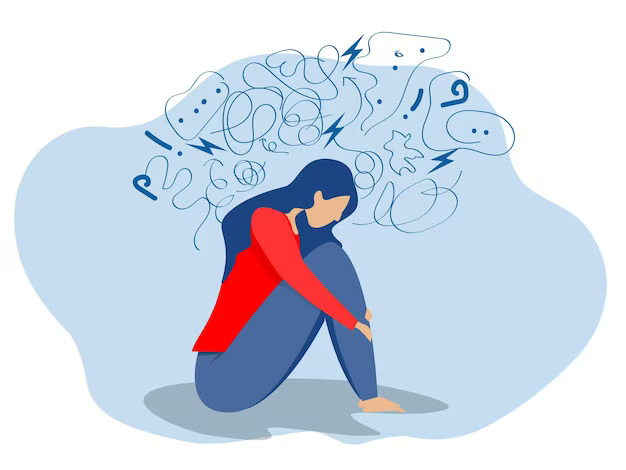Unresolved trauma refers to emotional, psychological, or even physical distress that persists over time without adequate resolution. It often stems from distressing experiences that have not been processed or understood in a way that promotes healing. These experiences could range from childhood trauma to more recent events, and the impact may linger, affecting various aspects of a person’s life. Unresolved trauma can manifest through persistent feelings of fear, anxiety, or difficulty in forming healthy relationships.
What can Unresolved trauma lead to?
Unresolved trauma can have far-reaching consequences, affecting both mental and physical well-being. It may contribute to conditions such as anxiety, depression, and post-traumatic stress disorder (PTSD). In relationships, it can strain connections, making it challenging to establish and maintain healthy bonds. Individuals may also resort to harmful coping mechanisms. Seeking support through therapy or counseling is vital to navigate and mitigate the lasting effects of unresolved trauma, fostering a path toward healing and resilience.
What Are the Risks of Unresolved Trauma?
If unresolved trauma is straining your relationship, connect with “Relationship counsellors” for essential help and healing.
- Persistent Emotional Distress: Lingering Trauma often leads to prolonged emotional suffering, including symptoms of anxiety, depression, or persistent sadness.
- Impact on Relationships: The effects of Ongoing Trauma can strain relationships, causing difficulties in trust, communication, and intimacy.
- Risk of Substance Abuse: Individuals may be at an increased risk of turning to substance abuse as a way to cope with the emotional pain associated with Unresolved Hurt.
- Physical Health Issues: Chronic stress from Undealt Trauma can contribute to physical health problems, such as headaches, gastrointestinal issues, and a weakened immune system.
- Negative Self-Image: Individuals with Ongoing Trauma may develop a negative self-perception, experiencing feelings of guilt, shame, or inadequacy.
- Disrupted Sleep Patterns: Trauma often interferes with sleep, leading to insomnia or disturbed sleep patterns, which can further contribute to physical and emotional fatigue.
- Flashbacks and Intrusive Thoughts: Persistent Trauma may result in intrusive memories, flashbacks, or recurring distressing thoughts related to the traumatic experience.
- Impaired Coping Mechanisms: Individuals may struggle with effective coping mechanisms, resorting to unhealthy behaviors or avoidance strategies.
Address Unattended Trauma in your Relationship with the targeted support and treatment offered through “Marriage counselling”.
What Causes Unresolved Trauma?
Unresolved trauma can result from various factors and circumstances. Here are explaining potential causes:
- Lack of Support: Insufficient emotional or social support during or after a traumatic event can contribute to Lingering Trauma.
- Early Childhood Experiences: Traumatic experiences during childhood, such as abuse or neglect, may not have been adequately addressed, leading to unresolved trauma.
- Inadequate Coping Skills: Limited coping mechanisms or an absence of healthy coping strategies can impede the resolution of traumatic experiences.
- Absence of Processing: If the individual hasn’t had the opportunity or tools to process the traumatic event, the trauma may remain unresolved.
- Repeated Trauma: Experiencing multiple traumatic events over time without sufficient intervention can compound and contribute to unresolved trauma.
- Lack of Therapeutic Intervention: Without professional help or therapeutic interventions, individuals may struggle to navigate and resolve their traumatic experiences.
- Cultural and Stigma Factors: Cultural factors or societal stigma around discussing trauma may discourage individuals from seeking help, perpetuating Persistent Trauma.
- Personal Resilience Levels: Variability in individual resilience levels can impact how effectively one copes and resolves trauma.
- Disruption of Attachment: Trauma can disrupt healthy attachment patterns, making it challenging to form secure connections, and hindering the resolution process.
It is essential to recognize the risks associated with Lingering Trauma and seek appropriate support and treatment.
10 Tips for Coping with Unresolved Trauma
Coping with unresolved trauma can be challenging, but some strategies may help individuals navigate the healing process.
- Seek Professional Support: Reach out to therapists, counselors, or support groups specializing in trauma to receive guidance and understanding.
- Educate Yourself: Learn about the effects of trauma and its impact on mental health. Understanding the dynamics can be empowering.
- Establish a Support System: Surround yourself with understanding and empathetic friends or family who can provide emotional support.
- Practice Self-Care: Prioritize self-care activities, such as exercise, relaxation techniques, and activities that bring joy, to promote overall well-being.
- Set Boundaries: Recognize and establish healthy boundaries in relationships to protect yourself from potential triggers or harmful situations.
- Journaling: Expressing emotions through writing can be a therapeutic way to process and make sense of traumatic experiences.
- Mindfulness and Meditation: Incorporate mindfulness or meditation practices to help manage stress and stay grounded in the present moment.
- Artistic Expression: Engage in creative outlets like art, music, or dance as a means of expressing emotions and fostering healing.
- Gradual Exposure: If comfortable, gradually expose yourself to triggers in a controlled way to build resilience over time.
In conclusion, coping with unresolved trauma is a complex journey that requires patience, self-compassion, and proactive steps toward healing. Seeking professional support, understanding the effects of trauma, and building a strong support system are crucial aspects of this process.

